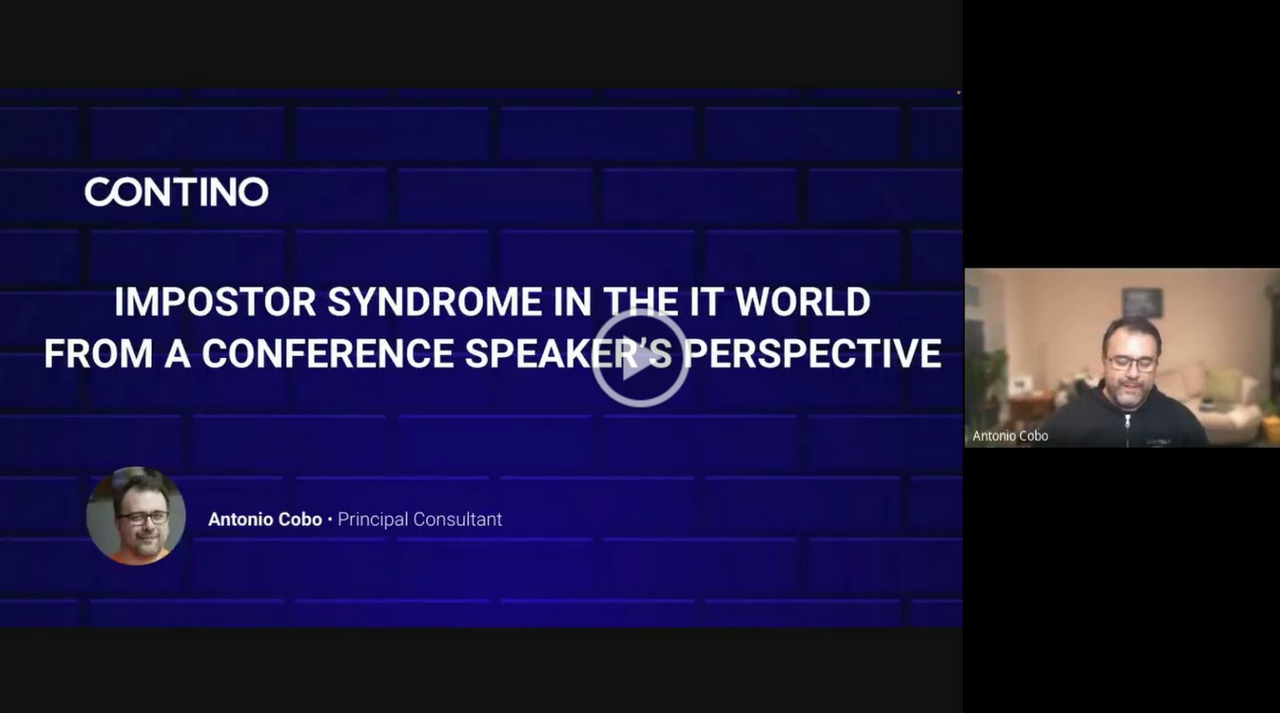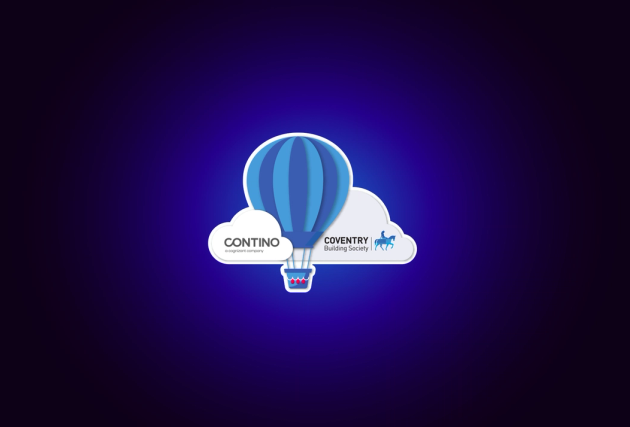Impostor Syndrome: Feeling Behind When It Comes to the Cloud? You’re Not Alone.
Feeling behind doesn’t mean you’re falling behind. Jim Curtis shares his own experiences with impostor syndrome and how reframing doubt as opportunity has helped him embrace discomfort, learn new skills and better connect with his team.
Imagine you’re in a meeting with a long-standing customer. You’ve built a strong relationship that you want to nurture by continuing to be open to new solutions and methods that will help them reach their goals. You’re listening attentively to your customer’s ideas when they mention a new tool and, out of nowhere, you’re hit with a wave of panic. Sure, you’re an expert in your field, but you prefer it when ‘above and beyond’ sits firmly within your skill set and experience. But with this tool, even though you’ve heard of it and know it will work for your customer, you’ve no hands-on experience, and yet, before you know it you’ve agreed to take on full technical ownership of it.
Cue the dread and self-doubt. How don’t I know this? Why did they hire me? Why didn’t I spend every second of my commute upskilling when I had the chance? Should I come clean and risk losing the customer’s confidence?
If this situation sounds familiar, you’re in good company. In an industry that moves at lightning speed, it’s no surprise that cloud professionals feel under constant pressure to be fully confident in and knowledgeable of the very latest technologies—ready to implement at the drop of a hat.
Cloud as an industry and impostor syndrome—loosely defined as the conviction that you’re a fraud in your profession despite evidence to the contrary—are a match made in heaven. It’s impossible to keep up with everything, but knowing what you don’t know doesn’t mean you should start doubting what you do know.
In this blog I’ll explore, based on my own experiences as a cloud security specialist, how working in cloud services and with certain technologies can affect confidence and mindset. I’ll also discuss how, if we catch those feelings of self-doubt, we can in fact use it to harness a range of opportunities for professional and personal development. By turning negative thoughts into positive ones, you’ll continue to grow into an evermore capable and solid cloud pro, who keeps coming back for more delicious cloud knowledge and experiences.
If a current challenge has you doubting your abilities and place within the industry, this blog is for you, and will hopefully show that not only are you not alone, but that, in moments of uncertainty, lies vast opportunity.
The irony of impostor syndrome is that the very people who are most likely to suffer from it are often the most competent and capable." - Amy C. Edmondson
What does impostor syndrome look and feel like?
Impostor syndrome, a phrase that’s made its way into the common business lexicon over the past decade, was first coined in 1978 as part of a study specifically relating to high-achieving women. It’s now used regularly to describe a sense of feeling like you’re a fraud in your job or unqualified to do it, even when you have a stack of evidence—and the paper qualifications—to show that you’re far from blagging it.
Google Trends shows searches on ‘impostor syndrome’ have risen considerably over the past decade.
There can be multiple contributing internal and external factors to impostor syndrome, such as moving to a new city or job, or being from an under-represented background, and as such it manifests itself differently in different people. Some feel physical sensations of anxiety or sickness. Others might have a constant underlying insecurity that can come out as mumbling in meetings, not confidently conveying ideas, overworking for fear that they’re always behind, and delaying decisions and not taking early action. The irony for some is that doubting that you can do your job properly can actually lead to you not doing your job properly.
At Contino, we work hard to foster an open working environment, where colleagues can speak honestly and authentically about their relationship with their work, and through this build more human connections that lead to positive practices and ultimately better results for clients. Many people fear that speaking about self-doubt might actually lead their colleagues to doubt their capabilities, but the opposite is true. Speaking about your perceived limits can help you get the positive feedback you need and the practical support you require to help you progress either on a project or towards your professional development goals.
Why Cloud Professionals Battle Impostor Syndrome
While impostor syndrome isn’t specific to any industry, there’s something about the pace of change in technology and cloud services that makes it ripe for feelings of self-doubt.
With the range of technologies, methodologies and frameworks that we have to dive (or simply dip) into while working in cloud, it’s easy to be overwhelmed by the sheer volume of knowledge that we think we have to possess. But just because you don’t know every single DevOps tool, NIST security control or Agile pillar by heart, it doesn’t mean you need to plunge into the pool of self-doubt.
Antonio Cobo, Principal Consultant at Contino, gives talks about overcoming feelings of self-doubt and impostor syndrome in the IT industry.
Four key aspects of cloud make it fertile ground for impostor syndrome:
- Constant, rapid technology change
- New and continuously evolving working practices
- Global sophisticated threat landscape
- Multi-cloud expansion
You might feel that every day you have to stay across all four of these topics and keep your finger on the pulse—all while doing your day job. The rate of change we’re currently experiencing is extensive and can be overwhelming, especially for early-career cloud professionals keen to make their mark; it can feel like losing even one day of up-to-the-minute news or knowledge will see you falling behind.
Impostor Syndrome and Tech Changes
Here are a few examples, based on my own experiences, of times where shifts in technology and ways of working have provided opportunities to turn self-doubt into self-improvement.
In 2014, HashiCorp introduced Terraform to ease the burden of infrastructure deployment and create closer ties with developers and infrastructure engineers, thus forming a DevOps mindset. Exploding in popularity, it became the favoured tool for deployment of cloud infrastructure in a very short space of time. However, as it’s code-based, it requires a different skill set. Within a year, engineers who had been deploying infrastructure via traditional methods in the cloud had to upskill and adapt their mindsets and attitudes to deploying resources whilst also transitioning skills to typically what a developer would do. For some this was overwhelming and not everyone learnt at the same pace, bearing in mind that other technologies and characteristics in the cloud were also evolving at the same time. The level of change in such a short space of time can lead one to believe that they’re no longer meeting the required standards to work in the cloud, but this of course isn’t the case. The solution is good old-fashioned perseverance and teamwork.
Evolving working practices
As well as technological advancements, cloud professionals also have to handle constant changes in working practices that increase automation and collaboration. Years ago, DevOps emerged from the wilderness, brilliantly suited to the cloud, with its on-demand resource availability and variety of CI/CD abilities to help bring together developers and operators in both technology and working practices. DevSecOps then followed to essentially apply security practices earlier on in the DevOps process. In an ideal world, DevSecOps would have arrived at the same time as DevOps but this didn’t happen, and it created an avoidable layer of complexity for cloud personnel.
Rather than a problem, this is simply an example of an opportunity for career growth. Many organisations that have implemented DevOps principles may need to review or reconfigure these according to a “shift left” mentality, and apply security principles much earlier in the life cycle. In consultancy, this presents a golden opportunity to speak honestly to customers about how to introduce security controls and practices into pipelines. Sometimes it’s OK to learn as the customer does—or a little bit before them. It would be easy for a cloud engineer to see this as another insurmountable topic and technology set to master, potentially leaving space for impostor syndrome to creep in, but know that working practices like DevSecOps are ever-evolving and require you to constantly refresh and update your knowledge. There’s no end point; you’re in an exciting industry that keeps things fresh—if you think you know everything, you’re probably doing it wrong.
Security doesn’t stop
Security plays a vital role in cloud, and the industry is rapidly innovating in both technology and practices to combat new threats levelled at cloud deployments. Seen as a separate entity, security is also all too often an afterthought. For example, you might be a DevOps engineer creating a new CI pipeline to deploy to Microsoft Azure using Terraform, Vault and Consul. You might just have got your head around Consul, when all of a sudden your manager informs you that you need to implement code security testing into the pipeline, using static application security testing (SAST). With a whole new sector of cloud technology put in front of you, you might think you’re on your own and need to learn this technology inside and out.
If you have the bandwidth, of course you should read up as much as you can, but teamwork really is the only way to help you achieve the desired outcome. This is where better division of responsibility comes in. Your team should be equipped with security professionals on hand to assist with implementing these tests and taking you through the process so you can implement these yourself in the future. If your team is not equipped with that security capability then you can again either view this as a problem or an opportunity to learn a new technology that could see you specialising in security, rather than deployment. That is one example of how vital security now is in the cloud landscape, but also how quickly it could upgrade someone's career and potentially transform it instead of feeding into the dreaded impostor syndrome.
How to prepare for the multi-cloud swell
Multi-cloud has been inevitable for some time and is necessary for the industry, however with its quick introduction, consultants and engineers of all levels have to consider the best way to expand their skill set without losing their specialisms. It’s already an arduous task to learn all the application, infrastructure, security, automation and monitoring toolsets for just one cloud provider, not to mention the decades of experience across multiple workstreams and certifications. When an organisation that’s previously been solely AWS decides to branch into a multi-cloud strategy and extend to Microsoft Azure, for example, it can initially be very daunting for those AWS pros.
All cloud professionals should be open to learning a new technology, but an AWS pro can’t be expected to learn the ins and outs of Azure to the same standard—at least not quickly. The impostor syndrome slides in when you think it’s realistic to do this, or indeed that everyone expects you to. It simply isn’t reasonable and can lead to exhaustion and dented confidence. This is where strategic hiring and upskilling comes in.
As the organisation develops this strategy and begins expansion, it should carefully plan out how to upskill existing staff with necessary, relevant and time-appropriate skills, while hiring externally to bolster the knowledge pool. This avoids any potential dilution of existing knowledge that they still need to retain and means that new staff can support in the learning and development of existing personnel.
In this example, new Azure-focused professionals can hit the ground running with this multi-cloud expansion whilst collaborating with the existing staff to share knowledge bi-directionally so that the AWS team gain a wealth of knowledge in Azure, without the pressure of having to master it overnight. It’s a win-win scenario.
Specialise Fearlessly and Ask for Help
The cloud stratosphere is constantly growing, and success within it relies on recognising that you can’t and won’t know everything. There will always be someone that’s better at a certain tool, coding language, working practice or has specialist knowledge of an industry sector. But, equally you are that person to someone else. You’ll have specialist skills, experience and knowledge that are still valuable even if you don’t have a complete grip on a specific tool. In my experience, specialising in one field and continuing to push yourself, while knowing what you don’t know will help you identify the gaps you need to plug and the ones you can lean on others to support with.
Everyone in cloud is at a different stage within their quest to advance within the industry and everybody is and always will be continuously learning. We’re at the forefront of innovation, and before you let negative thoughts seep in, you should acknowledge how difficult this industry is, and how hard you’ve worked to get here.
“Comparing yourself to others will inevitably lead to feelings of inadequacy. The only person you should compare yourself to is yourself—who you were yesterday and who you can be tomorrow” - Antonio Cobo, Principal Consultant and Agile Enthusiast, Contino
Even as someone who’s built up ten years’ experience across internal IT functions and consultancy since starting out as an apprentice in 2013, I still experience those familiar feelings of inadequacy with every shift and new tool. But I’ve realised that everyone has similar thoughts and, more importantly, that everyone has a role to play in both supporting and challenging each other to constantly excel.
I’ve picked the sector of cloud which is most exciting to me, security, and I can and will continue to develop my knowledge and experiences knowing that I’ll never ‘master’ it because of the daily change—but that doesn't deter me. It simply keeps me excited and affirms that I play one of the many vital roles that you can play in cloud. Whether you’ve more than 30 years’ experience or are just starting out, you’re not supposed to know everything, and the joy comes in harnessing the range of opportunities to learn and collaborate.
“By acknowledging that we don’t need to know everything and embracing a learning culture we can overcome impostor syndrome.” - Nigel Mahoney, Software Practice Lead and Agile Coach, Contino
How to Combat Impostor Syndrome
Your first step to dealing with imposter syndrome? Accepting it. Feelings of self-doubt and inadequacy are perfectly normal, especially if you take pride in your work and are in a demanding industry. What’s important is not letting those feelings take such a hold that you do yourself and your work a disservice. By facing how you’re feeling, and talking it through with a trusted friend or colleague, you can decide on the best course of action—usually a combination of silencing negative voices and practical measures that help you plug any knowledge gaps you might have.
As our very own coaching guru, Nigel Mahoney, says, we need to accept that we don’t know everything. It’s why recruiters so often say that having the right attitude is just as, if not more, important than having the right skills. You want to be open to learning and know that the pursuit of knowledge never ends.
Antonio Cobo likes to write a list to help overcome negative feelings. If you feel yourself sliding into vague negative thoughts about ‘knowing nothing’ or feeling out of place, get back to the specifics. Write out a list so you can separate facts from feelings and book in time to talk these through with a teammate, setting yourself next steps, actions and check-in meetings. You might also want to write a list of positive evidence—qualifications you have, projects you’ve completed, positive feedback you’ve been given—that you can refer back to as a pick-me-up whenever you’re having moments of doubt.
If you’ve just had a project come in that’s making you feel overwhelmed or panicked about what you don’t know and what you feel you should know, take the time to recalibrate. Be honest with yourself about what you know about a project and what you don’t know about it. When you know what you don’t know, you can decide whether you have time to take a cert, read up on the subject, or bring in an expert to support you.
If facing your imposter syndrome leaves you thinking it’s time to take another course, read our blogs on recommended certs for the major cloud service providers.









